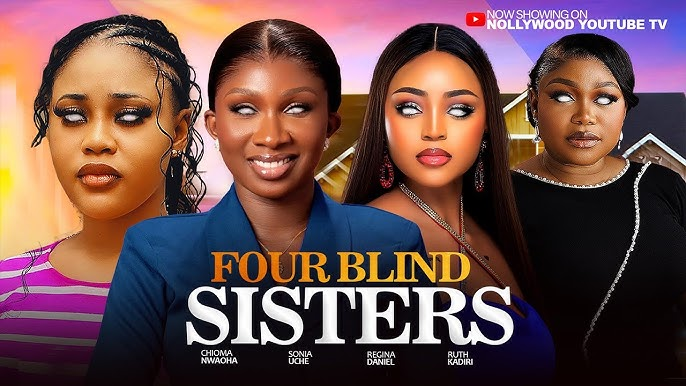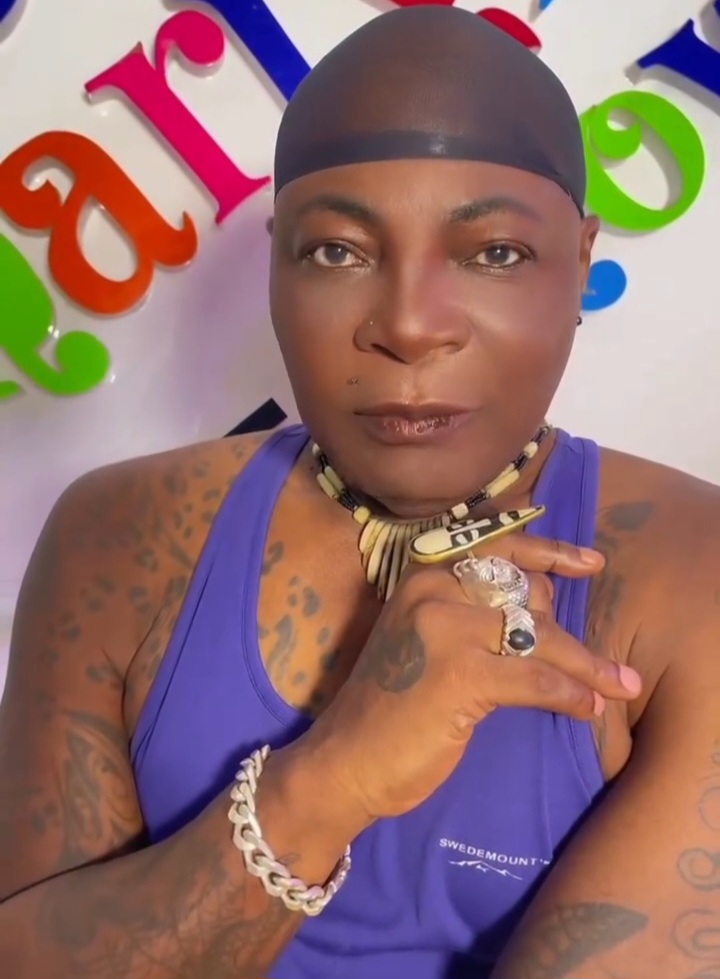The Nollywood cinematic universe is built on a foundation of fierce melodrama, stark moral binaries, and the omnipresence of spiritual warfare, and “FOUR BLIND SISTERS” leans into these conventions with the ferocity of a charging bull. This film, starring the dynamic Sonia Uche and a powerhouse antagonist, is not just a story; it’s a marathon of confrontations, confessions, and supernatural twists that challenges viewers to suspend their disbelief and submit entirely to its emotional, nearly two-hour journey.
While many international viewers might dismiss its stylings as ‘over-the-top,’ this critical analysis aims to place the film squarely within its genre—the epic moral drama—to evaluate whether its ambitious narrative structure, mixing raw class critique with fervent faith, ultimately delivers a cohesive and compelling story. At its core, “FOUR BLIND SISTERS” is a brutal examination of the Nigerian class divide, where wealth is cursed, and true power rests in the hands of the spiritually pure, however vulnerable or impoverished.
The Core Conflict: When Class War Meets Family Melodrama
The film sets its stakes immediately: the innocent, poor, and spiritually gifted Vera (Sonia Uche), despite her literal blindness, possesses a clear moral vision and miraculous power. Standing against her is Mrs. Doris, the archetypal tyrannical matriarch whose opulent lifestyle is underpinned by a dark, desperate ambition for her son, Dan, to marry into political power. When Dan attempts to choose Vera—the daughter of the streets—Mrs. Doris unleashes hell.
Pacing and the Rationale for the Runtime
The nearly two-hour runtime of “FOUR BLIND SISTERS” could easily be criticized as excessive, yet it serves a specific, structural purpose common in Nollywood’s epic dramas: the slow, drawn-out justification of the inevitable emotional climax. The initial hour is dedicated entirely to melodrama and repetition. We see Mrs. Doris issue threats, devise schemes, and verbally abuse Vera repeatedly. This redundancy isn’t a flaw; it’s narrative conditioning. Each scene of tyranny is a nail hammered into the coffin of the antagonist’s hubris, making her eventual, spectacular downfall not just satisfying, but meticulously earned.
The conflict between Vera’s poverty and Doris’s affluence is less a socioeconomic commentary and more a moral one. The film heavily implies that Nigerian class dynamics are inherently corrupt, with wealth leading to spiritual blindness and moral decay. Vera’s physical blindness paradoxically grants her the deepest vision, while Mrs. Doris, with all her sight and power, is revealed to be the truly sightless one, blinded by her own ego and, eventually, a terrifying blood pact. This setup ensures that the drama transcends mere relationship troubles and becomes a symbolic fight for the very soul of the upper class.
Character Dissection: The Tyrant’s Unraveling
The success of a story so heavily reliant on binary opposition rests almost entirely on the shoulders of its performers, and in this film, the actress portraying Mrs. Doris is a terrifying spectacle of ambition and eventual ruin.
The Unearned Confession?
Mrs. Doris’s arc is arguably the most demanding in the film, transforming her from a monstrous, high-society villain to a shattered, guilt-ridden convert. The actress carries the sheer weight of this transition with staggering commitment. Her initial tirades against Vera are delivered with chilling conviction, making her a genuinely hateable figure.
However, the question posed by the prompt remains: is her confession earned? Narratively, her change is catalyzed not by empathy or self-reflection, but by the physical and supernatural consequences of her actions—specifically the affliction and the ultimate revealing of the blood-pact. Her emotional breakdown is powerful, yet it is triggered externally (by the spiritual intervention) rather than internally (by moral recognition). This makes the conversion feel less like a true character evolution and more like a necessary narrative device to achieve thematic closure. The melodrama ensures her confession scene is a histrionic, cathartic release for the audience, successfully overriding any lingering questions of moral depth.
Sonia Uche’s Quiet Power
Sonia Uche, as Vera, plays a difficult role—the strong, silent sufferer. Portraying a blind character is challenging enough, but Uche is required to blend that physical vulnerability with immense spiritual power. She manages to maintain a delicate balance: her stillness and reliance on other senses suggest her disability, while her unwavering gaze (when speaking of God or miracles) and dignified refusal of corruption establish her immense spiritual fortitude.
Her performance truly shines during confrontations. She does not scream or rage; she speaks with an unsettling quietude that often proves more terrifying than Mrs. Doris’s shouts. The moment she is arrested and subsequently escapes jail using her healing gift—not for herself, but to serve others—is crucial, cementing her character as a transcendent figure above the mundane laws of man and the constraints of class. Uche grounds the otherwise ethereal role, making Vera’s spiritual authority believable without dissolving her into a mere prop of piety.
The Spiritual Battlefield: Faith, Miracles, and the Blood Pact
The film refuses to stay anchored in social realism and, around the midpoint, veers violently into the supernatural, introducing the terrifying reality of spiritual warfare.
Critiquing the Commercialization of Faith
Vera’s healing gift is positioned as a direct counter to the corruption around her. The director makes a pointed thematic choice: Vera consistently refuses to charge money for her miracles. This choice is vital, as it functions as a sharp, deliberate critique of the contemporary Nigerian landscape where faith and spiritual services have often become commercial enterprises. Vera’s adherence to the principle of giving freely frames her as a figure of true, pure faith, further emphasizing the moral bankruptcy of the wealthy antagonists.
The Hyperbolic Twist of Gumar
The late-stage introduction of the blood-pact, the spirit Gumar, and the revelation of an old murder is the moment the film decides melodrama is not enough; it needs to be hyperbolic. The twist is sudden and jarring, shifting the narrative from a domestic drama about star-crossed lovers to a spiritual thriller about inherited curses.
Is the twist necessary? Yes, to justify the scale of Mrs. Doris’s wickedness. Her behavior, as depicted, is too extreme for mere high-society vanity; it requires a demonic anchor. The blood-pact supplies this anchor, externalizing the evil and allowing the narrative to provide a definitive, violent, and spiritual solution. While this shift strains narrative cohesion, it delivers the high-stakes conflict Nollywood audiences crave—a tangible, supernatural evil that can only be conquered by Vera’s equally tangible, supernatural goodness. The confrontation between Vera’s light and the manifestation of Gumar provides the emotional payoff demanded by the preceding hour of suffering.
Technicalities and Final Verdict
From a technical perspective, “FOUR BLIND SISTERS” adheres to standard Nollywood production norms. The cinematography is functional, focusing heavily on actor close-ups to capture the raw emotional output. The sound design is deliberately employed to enhance the spiritual moments; the specific sound effects used during the healing process or Mrs. Doris’s affliction are designed to cue the audience into the supernatural nature of the events. While this might feel heavy-handed in a Western context, it is an effective tool in this genre for signifying the presence of divine or demonic power. The editing, while occasionally drawn out, successfully builds tension toward the inevitable confrontation scenes.
Key Review Metrics
|
Metric |
Rating |
Justification |
|---|---|---|
|
Narrative Cohesion |
6/10 |
The severe genre shift (domestic drama to spiritual thriller) is jarring, though functionally justified by the need for ultimate stakes. |
|
Emotional Impact |
9/10 |
The film excels here. The actress playing Mrs. Doris ensures the confrontation and confession scenes are emotionally overwhelming and deeply satisfying. |
|
Lead Performances |
8/10 |
Strong showing from Sonia Uche (Vera) who manages a difficult blend of sightlessness and spiritual sight, and the powerful actress embodying Mrs. Doris’s wicked ambition. |
|
Production Value |
6/10 |
Competent but standard. Relies on strong performances and dramatic direction rather than high-end technical polish (e.g., occasional flat lighting). |
|
Thematic Depth |
7/10 |
Powerful commentary on the intersection of wealth, faith, and corruption, though the faith critique is somewhat undercut by the use of miracles as a plot deus ex machina. |
The Verdict: A Testament to Genre Ambition
“FOUR BLIND SISTERS” is a film whose ambition occasionally runs away with its execution, but in the realm of Nollywood drama, that is often precisely the point. The film is less concerned with subtle character shading and more interested in delivering grand moral statements. It successfully merges the relatable pain of classism and family opposition with the ultimate cosmic battle between spiritual good and demonic evil. The suffering is great, the villainy is absolute, and the final spiritual victory is loud and resonant.
The structure—long periods of rising tension, broken by shocking acts of wickedness and culminating in a spiritual intervention—might test the patience of some, but it works as a cathartic engine for the thematic core: that true power does not reside in money or social standing, but in an unshakeable faith and moral clarity, even when physically sightless. It is a loud, messy, and ultimately potent piece of Nigerian spiritual melodrama.
Call-to-Watch: If you are ready for a powerful, high-stakes drama where the class struggle is settled not by lawyers or politicians, but by a blind saint armed with prayer, then grab favourite drink and settle in. This is Nollywood at its most passionate and unrestrained.
#NollywoodTimes
#Nollywood
#SpiritualMelodrama
#FaithVsWealth















Leave a Reply